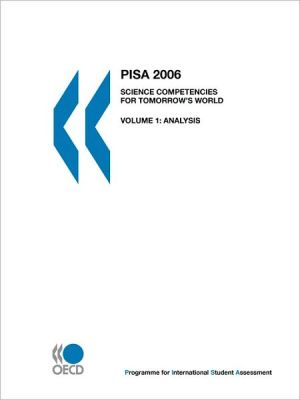

 |

|

Sold Out
Book Categories |
Are students well prepared to meet the challenges of the future? Are they able to analyse, reason and communicate their ideas effectively? Have they found the kinds of interests they can pursue throughout their lives as productive members of the economy and society? The OECD Programme for International Student Assessment (PISA) seeks to provide some answers to these questions through its surveys of key competencies of 15-year-old students. PISA surveys are administered every three years in the OECD member countries and a group of partner countries, which together make up close to 90% of the world economy.
PISA 2006: Science Competencies for Tomorrow's World presents the results from the most recent PISA survey, which focused on science and also assessed mathematics and reading. It is divided into two volumes: the first offers an analysis of the results, the second contains the underlying data.
Volume 1: Analysis gives the most comprehensive international picture of science learning today, exploring not only how well students perform, but also their interests in science and their awareness of the opportunities that scientific competencies bring as well as the environment that schools offer for science learning. It places the performance of students, schools and countries in the context of their social background and identifies important educational policies and practices that are associated with educational success. By showing that some countries succeed in providing both high quality education and equitable learning outcomes, PISA sets ambitious goals for others.
THE OECD PROGRAMME FOR INTERNATIONAL STUDENT ASSESSMENT (PISA)
PISA is a collaborative process among the 30 member countries of the OECD and nearly 30 partner countries. It brings together expertise from the participating countries and is steered by their governments on the basis of shared, policy-driven interests. Its unique features include: The literacy approach: PISA defines each assessment area (science, reading and mathematics) not mainly in terms of mastery of the school curriculum, but in terms of the knowledge and skills needed for full participation in society; A long-term commitment: It enables countries to monitor regularly and predictably their progress in meeting key learning objectives; The age-group covered: By assessing 15-year-olds, i.e. young people near the end of their compulsory education, PISA provides a significant indication of the overall performance of school systems; The relevance to lifelong learning: PISA does not limit itself to assessing students' knowledge and skills but also asks them to report on their own motivation to learn, their beliefs about themselves and their learning strategies, as well as on their goals for future study and careers.
Login|Complaints|Blog|Games|Digital Media|Souls|Obituary|Contact Us|FAQ
CAN'T FIND WHAT YOU'RE LOOKING FOR? CLICK HERE!!! X
 You must be logged in to add to WishlistX
 This item is in your Wish ListX
 This item is in your CollectionPisa Pisa 2006, Vol. 1
X
 This Item is in Your InventoryPisa Pisa 2006, Vol. 1
X
 You must be logged in to review the productsX
 X
 X

Add Pisa Pisa 2006, Vol. 1, Are students well prepared to meet the challenges of the future? Are they able to analyse, reason and communicate their ideas effectively? Have they found the kinds of interests they can pursue throughout their lives as productive members of the economy a, Pisa Pisa 2006, Vol. 1 to the inventory that you are selling on WonderClubX
 X

Add Pisa Pisa 2006, Vol. 1, Are students well prepared to meet the challenges of the future? Are they able to analyse, reason and communicate their ideas effectively? Have they found the kinds of interests they can pursue throughout their lives as productive members of the economy a, Pisa Pisa 2006, Vol. 1 to your collection on WonderClub |